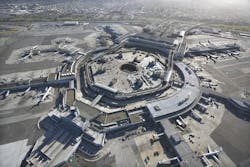OAKLAND, Calif., Aug. 16, 2012 /PRNewswire/ -- The Metropolitan Transportation Commission today announced that it is joining an important nationwide initiative called the National Alliance to Advance NextGen (NAANG). Created by the Port Authority of New York and New Jersey to call attention to the need for rapid upgrading of the nation's air traffic system, NAANG is made up of over 1,000 organizations of all kinds that use or rely on air travel and are concerned about the adverse economic and environmental impacts associated with the nation's current Air Traffic Control system.
By becoming part of the Alliance, MTC and other members of the Alliance support:
Federal Aviation Administration (FAA) reauthorization legislation that includes NextGen initiatives; full funding for NextGen initiatives in appropriation bills; an expedited FAA timeline for delivering NextGen technologies and benefits; technology that is compatible with Canadian, European and Asian partners; the FAA's prompt engagement with all partners necessary to ensure the successful implementation of NextGen technologies and procedures; and immediate deployment of NextGen, starting with the nation's most congested airspace.
"Our country's current air traffic control and management system is years old, and is not capable of handling aviation demands in the 21st century," said James P. Spering, Solano County Supervisor, MTC Commissioner and chair of the Regional Airport Policy Committee (RAPC). "The Federal Aviation Administration's Next Generation Air Transportation System – called NextGen – will alleviate delays at the nation's most congested and delay-prone airports, including those in the Bay Area, but is years and billions of dollars away from full implementation. Unless this system is rapidly upgraded to a satellite-based system of air traffic management, utilizing a portfolio of policy, procedures and 21st-century technology, air travelers will continue to experience gridlock in the sky over our busiest airports and economic growth will be stifled."
The latest study by RAPC (a joint committee of MTC, the Association for Bay Area Governments and the Bay Conservation and Development Commission) underscores the importance of NextGen as a key tool in managing the anticipated growth in the Bay Area's aviation demand at San Francisco International Airport, Oakland International Airport and Mineta San Jose International Airport. (Visit http://www.mtc.ca.gov/planning/air_plan/ to view the 2011 Regional Airport System Planning Analysis report.)
"As a world leader in the technology arena, there is no region that understands the power and potential of new technology better than the San Francisco Bay Area," said Spering. "And NextGen technologies will not only help manage one of the most complex airspace environments in the country, they will also deliver significant environmental benefits by allowing aircraft to perform quieter and more fuel-efficient landings, thus reducing both aircraft emissions and ambient noise levels."
In addition to MTC, all three of the Bay Area's major commercial airports and the region's most influential business organizations have joined the National Alliance to Advance NextGen. These business groups include: the Bay Area Council, San Francisco Chamber of Commerce, Silicon Valley Leadership Group, Joint Venture Silicon Valley and the East Bay Economic Development Alliance.
"We recognize that a modern and efficient air transportation system is a major driver of our vital regional economy," said Jim Lazarus, senior vice president of the San Francisco Chamber of Commerce. "San Francisco is one of the leading visitor destinations in the world and the region's economy depends on efficient air travel in and out of SFO. One of the largest industries in the country is still working with 1950s technology. We need a modernized air traffic system that can improve on-time performance, allowing aircraft to fly more precise, direct and fuel-efficient paths across the country and around the world."
"We applaud the progress the FAA is making with NextGen, but at an estimated cost of $40 billion, there are continuing concerns that appropriated levels for NextGen funding are falling short of what is needed," added MTC Commissioner Spering. "Additional delays in implementing NextGen will only increase costs for the program. Along with the other members of NAANG, we in the Bay Area are calling on Congress to make funding of NextGen a top national transportation and infrastructure priority again, and to fund the NextGen program at levels that will ensure its success."
MTC is the nine-county San Francisco Bay Area's transportation planning, coordinating and financing agency.
SOURCE Metropolitan Transportation Commission

